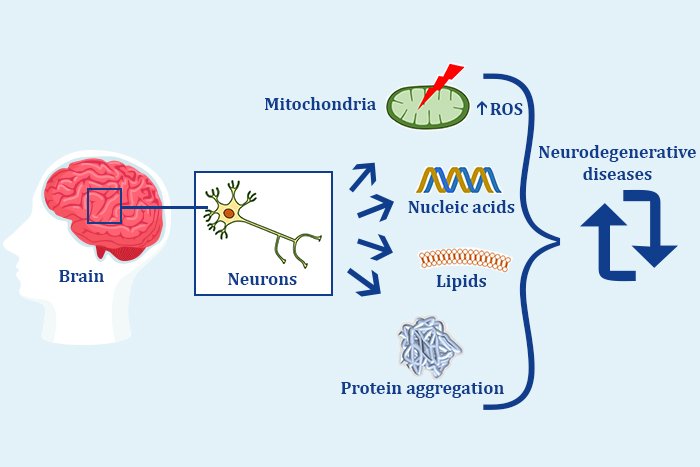Oxidative Stress and the Neurodegenerative Diseases

Neurodegenerative diseases are debilitating conditions that impair motor and cognitive functions. Theory points to oxidative stress, an imbalance between the formation of free radicals and antioxidants in the body, as a potential cause. This imbalance can lead to neuronal damage over time.
Oxidative stress may be linked to the plaques, tangles, and Lewy bodies observed in neurological diseases. Understanding the role of it could lead to new treatment options for these conditions.
Overview of Major Neurodegenerative Diseases
1. Alzheimer’s disease – It is the most common neuronal disease, accounting for 60-80% of dementia cases worldwide. It has amyloid beta plaques and neurofibrillary tangles in the brain, causing neuron loss and brain tissue shrinkage over time. This leads to progressive cognitive decline and loss of memory, reasoning, and daily living skills.
2. Parkinson’s disease – It is the second most prevalent disease in this category, affecting movement and coordination due to the loss of dopamine-producing neurons.
3. Amyotrophic Lateral Sclerosis (ALS) – Also known as Lou Gehrig’s disease, it involves the degeneration of motor neurons, leading to progressive muscle weakness and paralysis.
4. Huntington’s disease – It is an inherited disorder caused by a genetic mutation leading to cognitive, psychiatric, and movement deficiencies. While distinct, these major diseases share common mechanisms, like the disruption of the oxidant contributing to neural degeneration and immune cell death.
Mechanisms of Oxidative Stress
Oxidative stress occurs when free radicals overwhelm the body’s normal effectiveness of antioxidants. It forms naturally during metabolic processes but can also arise from external factors like pollution, radiation, cigarette smoke, and pesticides. Key free radicals include Reactive Oxygen Species (ROS) and Reactive Nitrogen Species (RNS). While usually kept in check by endogenous antioxidant compounds and enzymes, they can interact with and damage cellular components through oxidation when unchecked.
Potential consequences include lipid peroxidation, where cell membranes are destroyed, DNA mutations, altered protein structures and functions, and activation of genes involved in cell death pathways. Therefore, this phenomenon can drive substantial cellular damage and interfere with normal neuronal functioning.
Evidence Linking Oxidative Stress and Neurodegeneration
Increasing evidence from human studies and animal models implicates oxidative imbalance as a factor influencing neurodegeneration:
- Elevated markers of oxidative damage are found in brain samples and bodily fluids of patients with AD, PD, ALS, and Huntington’s.
- People with higher dietary antioxidant intake or blood antioxidant levels have reduced risks of cognitive impairment and neurological disorders.
- Animal models with genetically impaired antioxidant defenses or induced oxidative imbalance show neuronal deficits reminiscent of human degenerative conditions.
- Cultured neurons exposed to oxidative insults display disease-related changes like protein aggregation, mitochondrial dysfunction, and programmed cell death mechanisms.
While not proven as the sole causative factor, excessive oxidation interacts with other disease processes to drive neurodegeneration.
Antioxidant Therapies and Limitations
Several clinical trials have explored antioxidant compounds like vitamin E, coenzyme Q10, and creatine to reduce antioxidant imbalance in Alzheimer’s and Parkinson’s disease patients. However, these have largely shown limited or no effectiveness in slowing cognitive or motor decline. This may be due to factors like irreversible neuronal damage before treatment initiation, poor blood-brain barrier penetration of antioxidants, or the need to combine multiple antioxidant therapies that target different mechanisms of oxidative damage for sufficient efficacy.
Future Directions
Oxidative damage is a complex process involved early in the cascade, leading to neuronal death and dysfunction across major neurodegenerative diseases. While antioxidant therapies alone may have limited effects, continued research on combinational approaches or agents with improved brain bioavailability may prove more successful. Developing biomarker screens to identify at-risk individuals and initiate antioxidant treatment during presymptomatic stages could also improve outcomes.
Understanding interactions of imbalance between oxidants and antioxidants pathways with other key mechanisms like mitochondrial dysfunction, inflammation, and protein aggregation will provide further insight.
Taking Charge of Your Health
While research continues, understanding your risk factors for the effects of oxidative stress can be empowering. Consider lifestyle modifications like a healthy diet, including fruits and vegetables, regular exercise, as well as managing stress, which can contribute to a more antioxidant-rich environment within your body.
For in-depth insights into your excessive oxidation levels, consider exploring Helvetica Health Care’s suite of innovative testing products. By understanding your unique stress profile, you can proactively work with your healthcare professional to develop personalised strategies for optimising your health and well-being.
At Helvetica Health Care, we aim to provide efficient testing and diagnostics products that enhance lab research capabilities to detect OS biomarkers. Our range of OXIDATIVE STRESS assay kits and standards is designed to assist in exploring oxidative stress markers and metabolites in human and animal samples and samples exposed to drugs and foods.
The TBARS (Thiobarbituric Acid Reactive Substances) assay has become the assay of choice for screening and monitoring lipid peroxidation, a primary indicator of oxidative stress. The assay can be used with many types of samples, including drugs, food products, and material of human and animal origin, and it provides standardised and reproducible results.
Visit the Helvetica Health Care website to purchase oxidative stress-related products.
